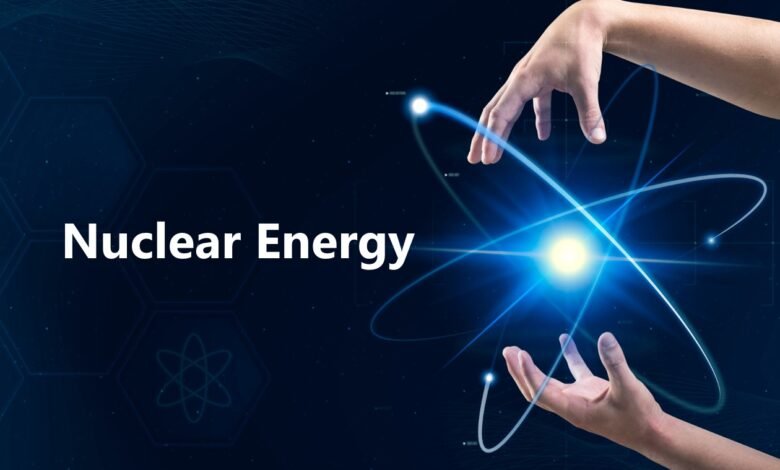The Role of Nuclear Energy in a Clean Energy Future

In recent years, the world has been facing a pressing issue – the urgent need for clean and sustainable energy sources to combat climate change. While renewable energy options like wind and solar power have gained significant attention, another contender in the race for a cleaner future is often overlooked: nuclear energy. This article will delve into the multifaceted role of nuclear energy in shaping a clean energy future.
Understanding the Energy Landscape
In this section, we will provide an overview of the current energy landscape and the challenges posed by fossil fuels. We’ll also introduce nuclear energy as a viable alternative.
Read More: HP’s new color laser printers are energy-efficient and eco-friendly
The Fossil Fuel Predicament
- Discuss the environmental impact of fossil fuels.
- Mention the increasing global energy demand.
The Promise of Nuclear Energy
- Highlight nuclear energy as a low-carbon option.
- Discuss its potential to meet energy demands.
The Basics of Nuclear Energy
Nuclear Energy: A Fundamental Overview
Nuclear energy is a powerful and efficient source of electricity that has been harnessed for decades to meet the energy demands of countries around the world, including the United Kingdom. At its core, nuclear energy relies on a process known as nuclear fission to generate electricity. Here’s a simplified breakdown of how it works:
Nuclear Fission: The Core Process
Nuclear fission is the process by which the nucleus of an atom, typically uranium-235 or plutonium-239, is split into two smaller nuclei when bombarded by neutrons. This process releases a tremendous amount of energy in the form of heat.
In a nuclear power plant, this heat is used to produce steam from water, which then drives a turbine connected to a generator. As the turbine spins, electricity is generated, and this electricity is fed into the grid for distribution to homes and industries.
Control and Safety
One of the critical aspects of nuclear energy is that the process of nuclear fission must be carefully controlled. Unlike a nuclear bomb, where the process is uncontrolled and explosive, nuclear power plants are designed to maintain a controlled chain reaction. This is achieved through the use of control rods, which can absorb neutrons and slow down or stop the fission process as needed.
Safety measures in nuclear power plants are stringent. Multiple layers of safety systems, including coolant systems, backup power supplies, and containment structures, are in place to prevent accidents and protect the environment. The United Kingdom, like many other nations, has strict regulations and oversight to ensure the safety of nuclear facilities.
The Role of Nuclear Energy in the UK
Nuclear energy has played a significant role in the United Kingdom’s energy mix for decades. As of my last knowledge update in September 2021, the UK has several operational nuclear power stations, including Hinkley Point, Sizewell, and Heysham. These power stations have been vital in providing a consistent and low-carbon source of electricity to the national grid.
Low Carbon Emissions
One of the key advantages of nuclear energy is its low carbon footprint. Unlike fossil fuels, which release substantial greenhouse gases like carbon dioxide when burned for electricity, nuclear power generates electricity without such emissions. This makes nuclear energy an essential tool in the fight against climate change and meeting carbon reduction targets.
Energy Security
Nuclear energy also contributes to energy security in the UK. By diversifying the energy mix and reducing reliance on imported fossil fuels, the country can enhance its energy independence and ensure a stable power supply, even in times of global energy market fluctuations.
Future Prospects
The United Kingdom has been exploring the possibility of developing next-generation nuclear reactors, which offer enhanced safety features and improved efficiency. These advancements could further solidify nuclear energy’s role in the country’s energy future.
In conclusion, nuclear energy is a critical component of the United Kingdom’s energy landscape, providing a reliable, low-carbon source of electricity. As technology continues to evolve, nuclear energy is expected to play an even more prominent role in ensuring a sustainable and secure energy future for the UK. Please note that developments may have occurred since my last knowledge update in September 2021, and I recommend consulting up-to-date sources for the latest information on the state of nuclear energy in the UK.
Nuclear Energy’s Environmental Footprint
Nuclear energy has gained attention for its relatively low environmental impact, making it an attractive option in the global effort to combat climate change. In the United Kingdom, nuclear power plants have played a significant role in reducing carbon emissions and providing a cleaner alternative to traditional fossil fuels. Here’s a closer look at the environmental aspects of nuclear energy:
Minimal Greenhouse Gas Emissions
One of the most significant environmental benefits of nuclear energy is its minimal greenhouse gas emissions. Unlike coal and natural gas power plants, which release substantial amounts of carbon dioxide (CO2) into the atmosphere when burned, nuclear reactors produce electricity without such emissions. This is a crucial factor in the fight against climate change, as reducing CO2 emissions is essential to mitigating global warming.
Comparison to Fossil Fuels
In the United Kingdom, nuclear power plants have consistently demonstrated their ability to generate electricity without contributing to the nation’s carbon footprint significantly. When compared to coal and natural gas power generation, nuclear energy stands out as a clean and low-carbon option.
Nuclear power is a reliable source of low-carbon electricity that can operate continuously, providing a stable power supply while reducing the country’s reliance on fossil fuels. This not only helps lower greenhouse gas emissions but also contributes to the country’s energy security.
Nuclear Waste Management
While nuclear energy offers substantial benefits in terms of low emissions, it does present challenges related to nuclear waste management. The process of generating electricity through nuclear fission produces radioactive waste materials, which require careful handling and disposal.
In the United Kingdom, as in many other countries with nuclear power plants, extensive efforts have been made to manage and store nuclear waste securely. The government has established regulations and protocols to ensure the safe handling, transportation, and long-term storage of radioactive materials.
Research and development in nuclear waste management technologies continue to advance, with a focus on finding sustainable and secure solutions for the long-term storage and disposal of nuclear waste.
Nuclear Energy: A Reliable Power Source
In the United Kingdom, as in many other nations, nuclear energy has earned a reputation as a dependable and resilient source of electricity. This dependability stems from several key factors that make nuclear power a cornerstone of the country’s energy infrastructure.
Base-load Power Generation
One of the primary reasons nuclear energy is revered for its reliability is its capability to provide base-load power generation. Base-load power refers to a consistent and uninterrupted supply of electricity needed to meet the constant demand for energy. Unlike some renewable sources, such as wind and solar, which are intermittent and dependent on weather conditions, nuclear reactors can operate continuously.
Nuclear power plants maintain a consistent output of electricity, regardless of external factors, making them well-suited for meeting the core energy needs of the United Kingdom. This reliability ensures a stable power supply, even during peak demand periods.
Grid Stability
Grid stability is crucial for the efficient and reliable distribution of electricity. Nuclear power plays a pivotal role in ensuring grid stability due to its ability to provide a constant and predictable source of electricity. This stability helps prevent fluctuations and blackouts, ensuring that homes, businesses, and industries receive a steady supply of power.
In the event of sudden changes in energy demand, nuclear reactors can adjust their output relatively slowly, providing a buffer against rapid disruptions. This characteristic makes them a valuable asset in maintaining a well-balanced and reliable electrical grid.
Energy Independence
Nuclear energy contributes to the United Kingdom’s energy independence by reducing reliance on imported fossil fuels. The country’s nuclear power plants provide a substantial portion of its electricity needs, reducing the need for costly fuel imports and enhancing energy security.
Energy independence is particularly vital during periods of geopolitical instability or fluctuations in global energy markets. Nuclear power’s consistent and domestic supply helps insulate the UK from external energy supply disruptions.
Addressing Concerns and Misconceptions
In this section, we will address common misconceptions and concerns about nuclear energy.
Radiation Risks
- Explain the controlled nature of radiation exposure in nuclear plants.
- Discuss the health risks in comparison to other industries.
Nuclear Proliferation
- Discuss international agreements and safeguards against nuclear weapons proliferation.
- Highlight the role of organizations like the IAEA.
The Future of Nuclear Energy
Now, we will look into the evolving landscape of nuclear energy and its integration with modern technologies.
Advanced Reactor Designs
- Discuss next-generation reactor designs, such as molten salt reactors.
- Highlight their safety and efficiency.
Nuclear Energy and Renewables
- Explore the possibility of combining nuclear energy with renewable sources for a diversified energy portfolio.
- Mention hybrid energy systems.
Read More: Armored Core VI: Fires of Rubicon follows up Elden Ring in August
Conclusion: A Clean Energy Mix
In the conclusion, we will summarize the key points and emphasize the importance of nuclear energy in a clean energy future.
Nuclear energy, with its low carbon footprint, reliability, and potential for innovation, holds a significant role in mitigating climate change and meeting the world’s energy demands.
FAQs
Is nuclear energy safe?
Nuclear energy is generally safe when stringent safety measures are followed in power plants.
How does nuclear energy compare to renewables?
Nuclear energy provides constant power, complementing the intermittent nature of renewables.
What is the biggest challenge in nuclear energy?
Managing nuclear waste and ensuring its long-term safety remains a significant challenge.
Can nuclear energy be the sole solution to clean energy?
While it plays a vital role, a mix of energy sources, including renewables, is ideal for a sustainable future.
How can nuclear energy contribute to energy independence?
By reducing reliance on fossil fuel imports, countries can enhance their energy security through nuclear power.











